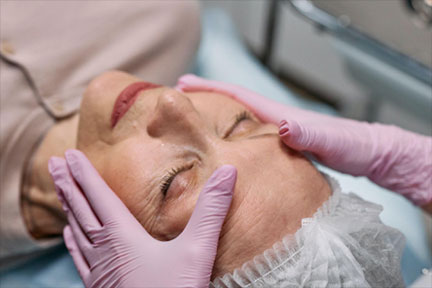
As you grow older, you probably notice the prevalent signs of aging, such as gray hair, wrinkles, and moments of forgetfulness. Although some things are uncontrollable, your skin should be one less thing you have to stress over.
The skin’s strength and elasticity reduce with age, known as elastosis. Aging skin looks thinner and paler, causing the skin to become more fragile. Fortunately, you can take preventive measures to repair your skin and slow down the aging process.
Invest in Skin Tightening Treatment 
The Thermage skin tightening treatment is a non-invasive and non-surgical procedure trusted by dermatologists and used as a tool to treat aging skin. Thermage radiofrequency waves gently tighten and lift loose and saggy skin. A key benefit of Thermage is that the effects gradually improve for several months following the treatment.
The Thermage treatment stimulates natural collagen production in the skin, enabling those receiving treatment to achieve a youthful appearance. You can get skin tightening treatment on many body areas, such as the face, including the eyelids, lips, neck, hands, arms, and neck. Luckily, the results of Thermage are gradual and subtle, allowing your transformation to look natural without alerting people that you have undergone treatment.
Embrace a Skincare Routine
A proper skincare regimen is vital to attain healthy skin, especially as you start to age. However, applying specific products isn’t enough to achieve good skin, and it is essential to follow the correct order in which you should apply your skincare products.
You may need to add a step or two if you need more items that target a specific skin condition. It is crucial to follow a skincare routine to maintain your skin religiously, and a proper skincare regimen will help you achieve clearer, smoother, and youthful skin.
You can also take preventive measures like using blue light for skin care to repair your skin and slow down the aging process.
Be Mindful of What You Eat 
The food you consume plays a role in the quality of your skin. When you eat food that contains high levels of sugar, oil, or other unhealthy items, it takes a toll on your skin. Your skin can break out, lose its original complexion, or look dull.
To achieve younger-looking with food, try to consume foods rich in vitamins and minerals. Your skin can benefit from items that contain ellagic acid, biotin, and vitamins C and E because they are natural collagen boosters. Since collagen is an essential protein in the skin that contributes vastly to your skin looks, it is vital to boost collagen. You can eat things like avocados, sweet potatoes, and blueberries for healthier skin.
Curb Habits That Age Skin
If you like to smoke or drink frequently, it might be time to curb those habits to attain healthy skin. The nicotine in cigarettes causes blood vessels to narrow, reducing oxygen flow and nutrients to the skin cells, which can cause premature signs of aging. In addition, cigarettes can damage skin elasticity and contribute to lines around the lips due to repetitive squinting.
Alcohol is also a culprit of aging skin, as it can dehydrate the skin, taking away the moisture and nutrients the skin requires. Skin dehydration can result in dull skin with prevalent signs of aging.
If you're concerned about signs of aging on your skin, follow the steps above to experience a significant change. You’ll be staring at yourself in the mirror and appreciating your beauty within a short time!
Disclaimer
This content is for informational purposes only and is not meant to replace the guidance of your licensed healthcare practitioner. Statements on this website have not been evaluated by the Food and Drug Administration. Information and products are meant for general use only and are not intended to diagnose, cure, treat, or prevent any disease or provide medical advice. Any decision to use supplements or medical or non-medical procedures to support your specific needs should be considered in partnership with your licensed healthcare practitioner. Any questions you may have concerning your use of drugs, medications, supplements, or medical or non-medical procedures should be directed to your healthcare provider. Publication of this article does not indicate an endorsement by SeniorLiving.com.
Photo Credits:
Photo 1: Pavel Danilyuk Via Pexels
Photo 2: cottonbro Via Pexels
Phooto 3: Anna Pelzer Via Unsplash
